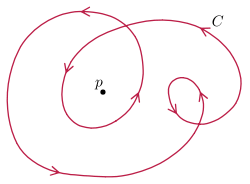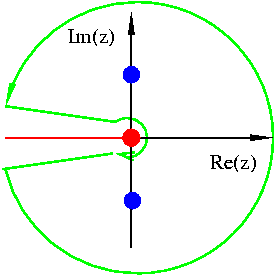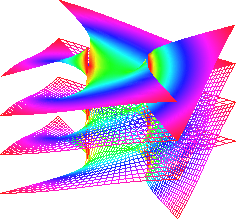|
Intro to Complex Analysis
(15-Math-7001) |
Riemann sphere, Möbius transformations, Cauchy-Riemann equations, Cauchy's Theorems & Integral Formulas, Argument Principle, The Residue Theorem, Riemann Mapping Theorem, Schwarz Christoffel Formula
|
Department of
Mathematical
Sciences |
|
|
|
|
|
This page is a work in progress! (Last revised 10 January 2018)
Instructor Prof David A Herron
4514 French Hall West 556-4075 |
My Office Hours
TuTh 10:00-10:55 and by appt |
E-mail me at David's e-address
My web page is at David's w-address |
Important Dates
- The deadline for grade replacement forms is January 23.
- The last day to drop this class (with no entry to your academic record) is March 23.
- The last day to withdraw from this class is Oct 31.
- The Final Exam is scheduled for Tuesday April 24 at 9:45am-11:45am; it will be cumulative.
- The in-class hour exams are tentatively scheduled for , , .
- There will be no class on January 15 (Martin Luther King Day), March 12-16 (Spring Break).
Basic Course Information
Sometimes it can be a good idea to look at more than one book/resource, because often one author will say things in just the 'right' way. There are zillions of books about Complex Analysis available in the Geo-Math-Physics Library, and you can just browse the library stacks for books whose numbers begin with QA331. Below I describe some books that I know are good or have heard good things about.
No single textbook will present all points of view on this subject, so if you don't find Palka's book helpful, I'd suggest looking at some of the others. Ahlfors was one of the greatest complex analysts of the twentieth century, and his book is a favorite among mathematicians. The texts by Ahlfors and Carathéodory are both very geometric, which I quite like, but rather sophisticated. The book by Greene & Krantz is interesting and takes a novel approach. Conway's book is similar to Ahlfors but while heavier on details, a feature many beginning students appreciate, far less geometric. Rudin's book integrates real and complex analysis into a single presentation (and is quite sophisticated, albeit most elegant). Palka's book is the most detailed of all and a great source for further problems to practice on. The books by McGehee and Palka are elementary with lotsa details presented. The books by Churchill & Brown, Greene & Krantz, McGehee, and Palka are all loaded with good problems. The book by Polya & Latta has some great parts too it, especially for wannbe physicists. Finally, the book by Remmert gives a history of the material we'll be covering in class.
Also, do not overlook the web as a resource. For example, see Links.
| Ahlfors |
Complex Analysis (third edition) |
| Carathéodory |
Theory of Functions (of a complex variable) Vols. I & II (second edition) |
| Greene & Krantz |
Function Theory of One Complex Variable (second edition) |
| Conway |
Functions of One Complex Variable |
| Rudin |
Real and Complex Analysis |
| McGehee |
An Introduction to Complex Analysis |
| Polya & Latta |
Complex Variable |
| Churchill & Brown |
Complex Variables and Applications |
| Remmert |
Theory of Complex Functions |
Course Goals
First and foremost, this is a course geared towards teaching you to think, act, and problem solve like a mathematician. Of particular importance, to me, is your acquiring the ability to communicate mathematical ideas effectively. This means learning how to read, and especially to write, mathematical proofs. We shall accomplish this in the guise of studying elementary complex analysis and the roots of geometric function theory. A subgoal, at least for some of you, is preparation for the preliminary PhD examination in complex analysis; I will have more to say about later.
Text Book
For our class, I will follow An Introduction to Complex Function Theory by Bruce Palka; see this at amazon.
General Syllabus
I hope to cover most material that appears on the syllabus for the Complex Analysis prelim. This roughly corresponds to Chapters I-VIII; we cannot possibly cover all of this in one semester, so you will need to read parts on your own.
What is complex analysis?
Calculus meets complex numbers could serve as a starting description of complex analysis, but this doesn't do justice to the potency of the combination. The notion of so-called imaginary numbers, shunned for its apparent absurdity but invoked for its usefulness, has been around since at least the Renaissance. But systematic attempts to take the notion seriously and to integrate it into algebra, analysis, and geometry only really got going in the nineteenth century with the work of Cauchy, Riemann and others. Many facts (e.g. the prime number theorem) that ostensibly belong to other areas of mathematics are difficult, if not impossible, to state or prove without complex analysis. And many physical theories (e.g. signal processing, quantum mechanics) are most naturally expressed in terms of complex analysis. Here we will see a large part of the classical theory of complex analysis (much of which has been known since the 19th century).
What will this course will cover?
The topics are fairly standard and cover chapters I-IX of the textbook. A more precise list of topics, in roughly the order we'll meet them, is as follows.
- Geometry and arithmetic of complex numbers.
- Definition and basic properties of complex holomorphic functions.
- Complex line integrals integrals and Cauchy's Theorems and Integral Formulas.
- Consequences and applications of Cauchy's Integral Formulas, including but not limited to
- Liouville's theorem
- the maximum principle
- isolated singularities
- calculus of residues
- The general forms of Cauchy's theorems.
- Conformal Mappings
- Normal families and the Riemann Mapping Theorem.
- (Hyperbolic geometry and the Poincaré metric)
Parenthetic topics are things I'd like to cover if time permits. Time is, however, a rather unforgiving taskmaster.
Your Course Grade
Your final course grade will be determined from your performance on midterm exams, a final exam, your homework scores, and class participation. Roughly speaking, an A means your work is at the PhD level, a B indicates masters level work, and anything less describes work that is not at the graduate level.
Your grade will be determined solely from your exam and HW scores there will not be any possible "extra credit".
Homework will be assigned daily; there will be suggested exercises along with HW that is collected and graded. I encourage you to work with other members of the class, but the HW that you turn in must be your own work. It is your responsibility to turn in the homework assignments on or before the due dates. Late homework will not be accepted. Please adhere to the guidelines when writing your assignments. Work which does not meet these requirements will not be graded.
Unless I explicitly indicate otherwise, you should read everything in the text and try to work all of the exercises and problems that you find as you read. Any of these exercises, as well as all of the "fill in the details" that I mention during lectures, are fair game as "easy" exam questions.
I will start each class by answering questions. I encourage you to talk to other members of the class or to ask me for help.
Course Exams
- The Final Exam is scheduled for Tuesday April 24 at 9:45am-11:45am; it will be cumulative.
- The in-class hour exams are tentatively scheduled for TBA, TBA, TBA.
Links
Here are some links to various pdf files for old notes, problems, text books, interesting web pages, etc.
Here are some links to articles about writing mathematics.
Writing Mathematics
Class Stuff
University Policies
University Information
The last day to drop this class (with no entry to your academic record) is September 8, 2015. The last day to withdraw from this class is October 30, 2015. These are official UC dates and something I have no control over. If you withdraw from this course, I will be required to verify whether or not you minimally participated in the class. Although I will try my best to respond accurately, in the absence of any evidence to the contrary, I will state that you did not minimally participate. Ways for you to provide clear evidence of your presence in the class include turning in at least one homework assignment, taking at least one quiz, or taking at least one exam.
Academic Integrity Policy
The University Rules, including the Student Code of Conduct, and other documented policies of the department, college, and university related to academic integrity will be enforced. Any violation of these regulations, including acts of plagiarism or cheating, will be dealt with on an individual basis according to the severity of the misconduct.
Special Needs Policy
If you have any special needs related to your participation in this course, including identified visual impairment, hearing impairment, physical impairment, communication disorder, and/or specific learning disability that may influence your performance in this course, you should meet with the instructor to arrange for reasonable provisions to ensure an equitable opportunity to meet all the requirements of this course. At the discretion of the instructor, some accommodations may require prior approval by Disability Services.
Except for a few courses, all mathematics classes satisfy the University Quantitative Reasoning Requirements. This course satisfies the QRR of UC's General Education program. This course was designed following the guidelines of the University of Cincinnati General Education Program. It satisfies, or partially satisfies, the Quantitative Reasoning distribution requirement. Moreover, of the five Baccalaureate Competencies, this course
focuses on Critical Thinking, Effective Communication, and Information Literacy.





